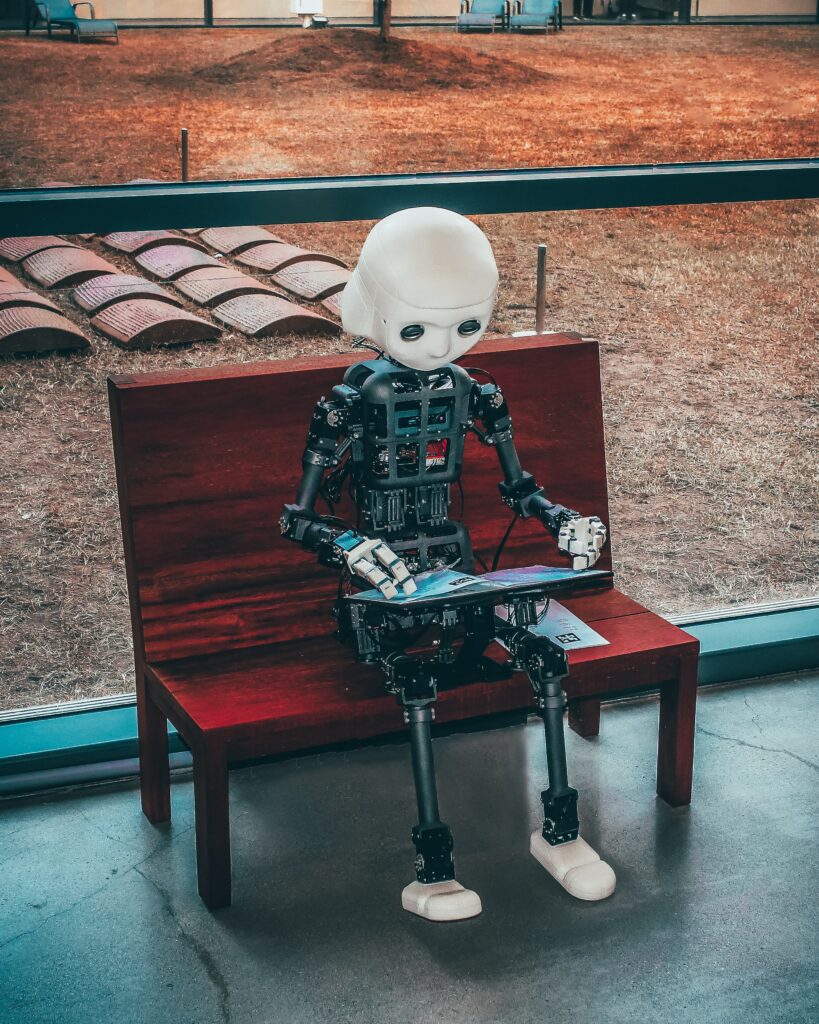Inclusive AI-Based Chatbots for Public Services in Finland: Potential of Constructivism
Hosseini, Z., & Tupasela, A. (2025, January). Inclusive AI-Based Chatbots for Public Services in Finland: Potential of Constructivism. In The Barcelona Conference on Arts, Media & Culture: 2024: Official conference proceedings (pp. 159-175).
Even with new digital tools being introduced, many people still struggle to access public services online. This study argues that we need better solutions that work for both users and service providers.
At the heart of the idea is this: everyone using public services is constantly learning about technology, language, and culture. So, digital tools like chatbots should support that learning process.
The paper suggests using constructivism, a learning theory that focuses on how people build knowledge through experience, to design more inclusive chatbots. Instead of just answering questions based on keywords, chatbots could act more like digital mentors, guiding users step by step, adapting to their needs, and helping them grow more confident in using digital services.
By applying constructivist principles, chatbots can offer personalized and culturally sensitive support while also helping users improve their digital skills. This way, users can learn and evolve through real interactions.

Unraveling Code-Mixing Patterns in Migration Discourse: Automated Detection and Analysis of Online Conversations on Reddit
Vitiugin, F., Lee, S., Paakki, H., Chizhikova, A., & Sawhney, N. (2024). Unraveling Code-Mixing Patterns in Migration Discourse: Automated Detection and Analysis of Online Conversations on Reddit. arXiv preprint arXiv:2406.08633.
Even though the Nordic countries have strong public service systems, many recent immigrants still face challenges when trying to use them. These challenges (such as language barriers or lack of digital access) can lead to feelings of exclusion and mistrust.
This study looks at how migrants communicate online, especially on platforms like Reddit, where people often mix languages in a single message, a practice known as code-mixing. To better understand this, we developed a new tool called ELMICT (Ensemble Learning for Multilingual Identification of Code-mixed Texts). It uses advanced AI techniques to automatically detect when people are mixing languages in their posts.
ELMICT performs very well, helping us understand how often code-mixing occurs in conversations about migration and which topics matter most to migrant communities. This knowledge can help governments and organizations design more inclusive digital services that truly meet the needs of diverse communities.

Design Research Artefacts for Knowledge Co-creation with Civil Servants Supporting Migrants: A Case Study
Šerpytytė, R., Pakpour Haji Agha, A., Häkkinen, A., Sekar, B., Bakic, I. A., & Olsson, T. (2024, October). Design Research Artefacts for Knowledge Co-creation with Civil Servants Supporting Migrants: A Case Study. In Proceedings of the 13th Nordic Conference on Human-Computer Interaction (pp. 1-10).
Involving civil servants in research can provide valuable insights into how people experience public services. But to truly collaborate with them, researchers need to use methods that respect their time and roles. This paper shares a case study from Trust-M’s work at our interaction partner the City of Espoo, Finland, where our researchers worked with civil servants who interact directly with migrants.
Trust-M researchers Rūta, Amir, Anne, Bhuvana, Irena, and Thomas used three creative tools—mind maps, proto-personas, and notebooks—to explore complex topics like trust in society and integration. These tools helped everyone involved to better understand each other’s perspectives and reflect together. By looking at how these tools were designed and used, the study offers practical tips for doing research in the public sector. It also highlights how such tools can support meaningful collaboration between different groups.

Construction of Hyper-Relational Knowledge Graphs Using Pre-Trained Large Language Models
Datta, P., Vitiugin, F., Chizhikova, A., & Sawhney, N. (2024). Construction of Hyper-Relational Knowledge Graphs Using Pre-Trained Large Language Models. arXiv preprint arXiv:2403.11786.
Building detailed knowledge graphs (i.e., tools that help organize and connect information) is important, but it’s hard to find good methods that can handle complex relationships between multiple things. To help solve this problem, we developed a new approach that uses OpenAI’s GPT-3.5 model to extract these complex connections from text, even without any prior training (a technique called ”zero-shot learning”).
When the authors tested their method against a basic model, it performed well, correctly identifying 77% of the relevant information. While it still makes some mistakes, our analysis of the results has revealed useful insights that could guide future improvements.

Evaluating privacy, security, and trust perceptions in conversational AI: A systematic review
Leschanowsky, A., Rech, S., Popp, B., & Bäckström, T. (2024). Evaluating privacy, security, and trust perceptions in conversational AI: A systematic review. arXiv preprint arXiv:2406.09037.
Conversational AI (CAI) is becoming a regular part of our daily lives. While many people use these tools, they also have concerns about how their personal information is handled, how secure these systems are, and whether they can truly trust them.
This study looks at how people feel about privacy, security, and trust when using CAI systems. To do this, Anna Leschanowsky together with Trust-M researchers Silas Rech and Tom Bäckström reviewed existing studies to understand what has already been discovered and where gaps remain.
One key finding is that privacy, security, and trust are closely connected, often overlapping in how people experience them. However, most studies only focus on one of these areas at a time, rather than looking at all three together.

Enhancing Conversations in Migrant Counseling Services: Designing for Trustworthy Human-AI Collaboration
Truong, L., Lee, S., & Sawhney, N. (2024). Enhancing Conversations in Migrant Counseling Services: Designing for Trustworthy Human-AI Collaboration. Proceedings of the ACM on Human-Computer Interaction, 8(CSCW2), 1-25.
Migrants often face challenges when trying to settle into a new country, especially when dealing with services and paperwork. They usually get help from service advisors, as well as from other migrants who share their experiences.
New technologies like artificial intelligence (AI) could make these conversations more effective. AI tools might help migrants become more independent while still benefiting from expert advice.
This research looks at how guidance is given to migrants in Finland and explores how AI could support this process. The study suggests ways to improve communication, such as using clear summaries of conversations and visual tools that help both sides understand each other better. It also highlights the importance of sharing knowledge between migrants, advisors, and experts, which is something AI could help organize and enhance.

Affects of trust in digitally mediated public service encounters between service providers and migrants.
Häkkinen, A., Chajed, A. & Ylipulli, J., (2023). Affects of trust in digitally mediated public service encounters between service providers and migrants. ETMU Days, Structures of Power and Oppression, 29th November – 1st December 2023, Jyväskylä.
Recent studies have pointed out that Finnish municipalities may not consider diversity in their planning enough. Even though Finland has relatively good public services, they may not be equally accessible and inclusive to everyone, especially migrants. Challenges include a lack of information in languages other than Finnish, Swedish or English. The high level of digitalization in public services also creates inequalities.
In this paper Trust M researchers Anne Häkkinen, Avanti Chajed and Johanna Ylipulli focus on the importance of trust in the interactions between linguistically diverse customers and public services. The researchers also aim to contribute to understanding how trust/distrust influences the use of digital services and technologies.

Socio-technical Design Directions for Fostering Migrants’ Trust in Public Sector Services.
Hosseini, Z., Olsson, T., Pakpour, A., Ylipulli, J., Tupasela, A.,Sawhney, N., Eskelinen, V. (2023). Socio-technical Design Directions for Fostering Migrants’ Trust in Public Sector Services. Apr 23, 2023 – Apr 28, 2023. Hamburg
Trust is an important part in creating a feeling of security. Citizens generally have high trust in fellow citizens, authorities and public institutions in Nordic welfare states. Many migrants, however, might not share this trust, which may lower the efforts by the public sector to facilitate their integration.
In this paper Trust M researchers Zahra Hosseini, Thomas Olsson, Amir Pakpour Haji Agha, Johanna Ylipulli, Aaro Tupasela, Nitin Sawhney and Viivi Eskelinen explores the connection between trust and security in the context of migration.
The authors explore migrants’ challenges to trust the host society and suggest initial directions for digitalization efforts that could help address the challenges associated with trust in the context of migration.

“Artificial Intelligence is a Cold Thing”: Understanding Experiences of Older Citizens to Design Municipal Digital Support Services.
Ylipulli J. and Eskola R. (2023, May): “Artificial Intelligence is a Cold Thing”: Understanding Experiences of Older Citizens to Design Municipal Digital Support Services. Workshop on Designing the City: Challenges and Opportunities in Public Service Design, Communities and Technologies (C&T) Conference, May 29–June 02, 2023, Lahti, Finland.
Older citizens’ digital skills may not be consistent; while they express strong concerns about data collection, they also lack some fundamental technical skills. Digital support should be designed to consider the needs of elderly. Broader understanding of technological phenomena in general should be increased to enhance the digital agency of the older citizens.
In this paper, Trust M researcher Johanna Ylipulli together with Riikka Eskola explore how older people use technology to help design better digital support services for them. For the study, the researchers did 14 interviewees with people aged over 65 and three people who help with technology. The study has been conducted as a part of DISC project (Digital Inequalities in Smart Cities, AoF grant no 332143), but it is contributing to topics relevant for Trust-M.

Practitioners’ Perspectives on Inclusion and Civic Empowerment in Finnish Public Sector AI.
Drobotowicz, K., Truong, L., Gonzalez Torres, A. P., Ylipulli, J., and Sawhney, N. 2023. Practitioners’ Perspectives on Inclusion and Civic Empowerment in Finnish Public Sector AI. In Proceedings of ACM Communities & Technologies Conference (C&T), May 29–June 02, 2023, Lahti, Finland.
Public sector is using more and more new technologies, such as artificial intelligence (AI), to create innovative services. These public services, which use AI, however, come with risks and responsibilities for citizens and the public service providers.
In this paper Nitin Sawhney, Johanna Ylipulli and Nghiep Lucy Truong from Trust M, together with Karolina Drobotowicz and Ana Paula Gonzalez Torres interviews ten people who work on AI services in Finland to explore attitudes, practices, and challenges in implementing inclusive AI services in the public sector, aiming to empower inclusivity and greater civic engagement.

Re-evaluating Evaluation: Looking for Value-based Metrics in Public Service Design.
Varanasi, U., Šerpytytė, R., & Sawhney, N. 2023. Re-evaluating Evaluation: Looking for Value-based Metrics in Public Service Design. Workshop on Designing the City: Challenges and Opportunities in Public Service Design, Communities and Technologies (C&T) Conference, May 29–June 02, 2023, Lahti, Finland.
Design is important for cities as it helps make things work better, from services to overall strategies. In this paper, Uttishta Varanasi, together with Ruta Serpytyte and Nitin Shawney from Trust M, argues that design and its evaluation need to go beyond quantitative measures and towards more value-based metrics, meaning that using numbers and checklists isn’t enough, as the public sector is more complicated than that.
As design researchers and practitioners working in the public sector, the authors do not agree that there is a perfect design for everything. They rather suggest that fairness and including everyone should be the most important things when talking about design in the public sector.

Participatory Design for Whom? Designing Conversational User Interfaces for Sensitive Settings and Vulnerable Populations
Houben, M., van As, N., Sawhney, N., Unbehaun, D., and Lee, M. 2023. Participatory Design for Whom? Designing Conversational User Interfaces for Sensitive Settings and Vulnerable Populations. In Proceedings of the 5th International Conference on Conversational User Interfaces (CUI ’23). ACM, NY.
Conversational User Interfaces (CUIs) are like talking computer programs that are used in places where people might need extra help, like those who have trouble remembering things (like people with dementia) or refugees who are learning new ways of doing things in a new country. Even though more and more researchers are making these interactive computer programs for these situations, there aren’t many ways to make sure they really work for the people who need them the most.
In this workshop paper, Nitin Sawhney from Trust M with his colleagues talks about figuring out how to make these talking computer programs better for people in these tough situations. The paper is available here.

